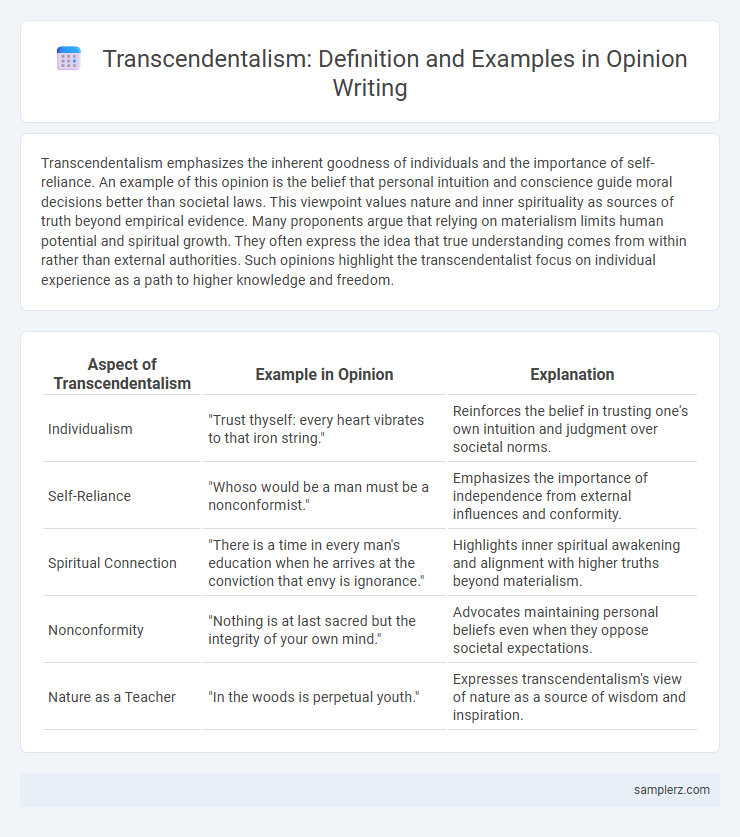Transcendentalism emphasizes the inherent goodness of individuals and the importance of self-reliance. An example of this opinion is the belief that personal intuition and conscience guide moral decisions better than societal laws. This viewpoint values nature and inner spirituality as sources of truth beyond empirical evidence. Many proponents argue that relying on materialism limits human potential and spiritual growth. They often express the idea that true understanding comes from within rather than external authorities. Such opinions highlight the transcendentalist focus on individual experience as a path to higher knowledge and freedom.
Table of Comparison
| Aspect of Transcendentalism | Example in Opinion | Explanation |
|---|---|---|
| Individualism | "Trust thyself: every heart vibrates to that iron string." | Reinforces the belief in trusting one's own intuition and judgment over societal norms. |
| Self-Reliance | "Whoso would be a man must be a nonconformist." | Emphasizes the importance of independence from external influences and conformity. |
| Spiritual Connection | "There is a time in every man's education when he arrives at the conviction that envy is ignorance." | Highlights inner spiritual awakening and alignment with higher truths beyond materialism. |
| Nonconformity | "Nothing is at last sacred but the integrity of your own mind." | Advocates maintaining personal beliefs even when they oppose societal expectations. |
| Nature as a Teacher | "In the woods is perpetual youth." | Expresses transcendentalism's view of nature as a source of wisdom and inspiration. |
The Essence of Transcendentalism in Personal Opinion
The essence of transcendentalism in personal opinion lies in the belief in the inherent goodness of individuals and nature, emphasizing self-reliance and intuition over societal conformity. This philosophy champions the idea that true understanding and insight come from within, advocating a deeper spiritual connection beyond empirical evidence and organized doctrine. Such opinions often inspire a profound sense of individuality and a commitment to personal growth aligned with universal truths.
How Transcendentalist Ideas Shape Subjective Perspectives
Transcendentalist ideas profoundly shape subjective perspectives by emphasizing the inherent connection between the individual and nature, encouraging personal intuition as a guide to truth rather than relying on external authorities. This philosophy fosters a deep sense of self-reliance and spiritual insight, allowing opinions to be formed from personal experience and inner conviction. Consequently, transcendentalism nurtures original thought and a unique worldview, highlighting the importance of individual perception in the construction of meaning.
Self-Reliance: A Transcendentalist Foundation for Opinion
Ralph Waldo Emerson's essay "Self-Reliance" exemplifies transcendentalism by championing individual intuition and personal judgment as the ultimate sources of truth. This philosophy encourages rejecting societal conformity and trusting one's inner voice, which fosters authentic and independent opinions. Embracing self-reliance cultivates a mindset that values originality and moral integrity over external approval, grounding opinions in personal conviction rather than popular consensus.
Intuition over Conformity: The Transcendentalist Approach
The Transcendentalist emphasis on intuition over conformity highlights the belief that personal insight and inner guidance surpass societal expectations and external rules. This philosophy encourages individuals to trust their own perceptions and moral compass rather than blindly following established norms or collective opinions. Ralph Waldo Emerson's essays frequently illustrate this stance, advocating for self-reliance as the path to authentic understanding and spiritual growth.
Nature as a Source of Independent Thought
Nature serves as a fundamental source of independent thought in transcendentalism, inspiring individuals to trust their intuition and connect deeply with the natural world. Emphasizing self-reliance and personal insight, transcendentalists view nature as a living symbol that encourages spiritual growth and intellectual freedom. This philosophical approach highlights the importance of solitude in nature for fostering original ideas and authentic experiences beyond societal conventions.
Authenticity in Opinion: Lessons from Transcendentalism
Transcendentalism emphasizes authenticity in opinion by encouraging individuals to trust their inner voice rather than conforming to external pressures or popular beliefs. Ralph Waldo Emerson's essay "Self-Reliance" advocates for personal intuition as a foundation for genuine opinions, showcasing the movement's core principle of individualism. This philosophical stance inspires a deeper engagement with one's values, promoting opinions rooted in self-awareness and moral integrity.
Ralph Waldo Emerson’s Influence on Modern Opinions
Ralph Waldo Emerson's philosophy of individualism and self-reliance continues to influence modern opinions by encouraging people to trust their own intuition and reject societal conformity. His transcendentalist ideas promote a deep connection with nature and the belief that personal experience is paramount in shaping truth and morality. This has inspired contemporary movements valuing authenticity, environmental consciousness, and a critical approach to traditional institutions.
Personal Freedom and Nonconformity in Expressed Beliefs
Transcendentalism values personal freedom and nonconformity in expressed beliefs as essential to authentic self-expression and individual growth. Writers like Ralph Waldo Emerson emphasized trusting one's inner voice over societal expectations to achieve spiritual and intellectual independence. This philosophy champions breaking free from conventional norms to cultivate unique perspectives and elevate personal truth.
The Role of Inner Voice in Forming Opinions
Transcendentalism emphasizes the importance of the inner voice as a primary guide in shaping personal opinions, advocating for self-reliance and intuition over external influence. Ralph Waldo Emerson and Henry David Thoreau illustrated this through their belief that authentic opinions arise from individual conscience and spiritual insight rather than societal norms. This underscores how inner reflection fosters a deeper, more genuine understanding that transcends conventional reasoning.
Transcendentalism and the Power of Individual Perspective
Transcendentalism emphasizes the inherent strength of individual perspective in shaping reality and truth, asserting that personal intuition transcends empirical evidence. This philosophy champions self-reliance and inner wisdom as essential tools for understanding the world beyond conventional societal norms. The power of individual perspective in transcendentalism fosters a deeper connection to nature and the universe, promoting authentic, original thought over blind adherence to external authorities.

example of transcendentalism in opinion Infographic
 samplerz.com
samplerz.com